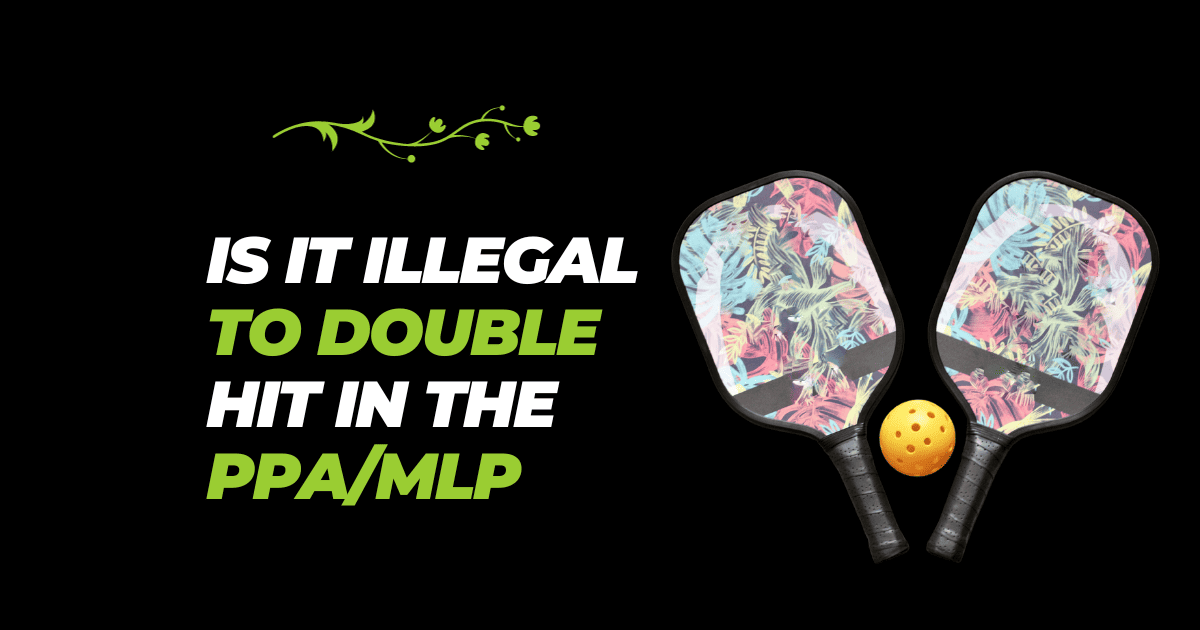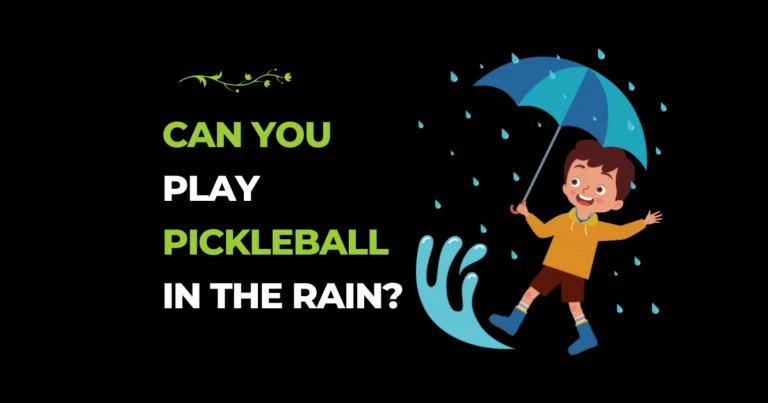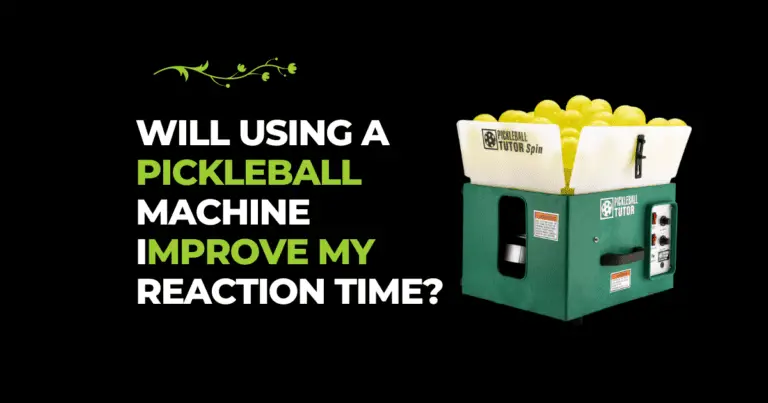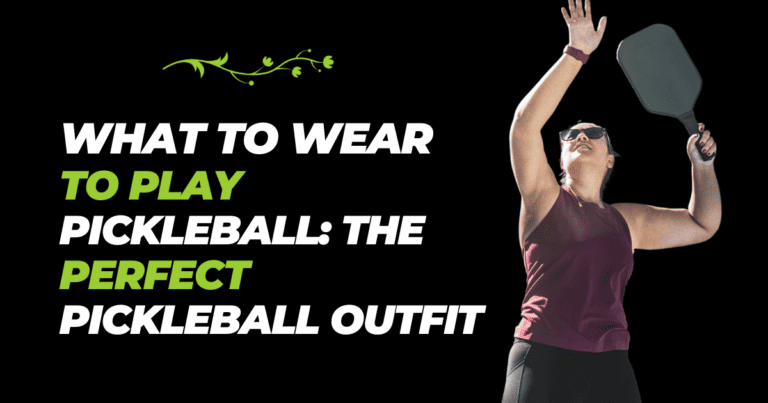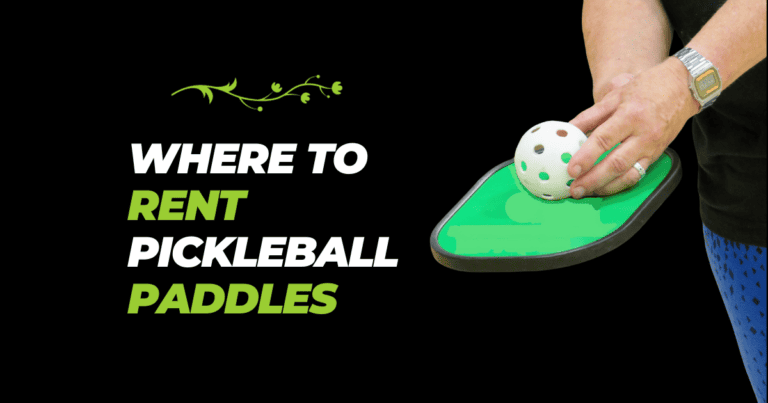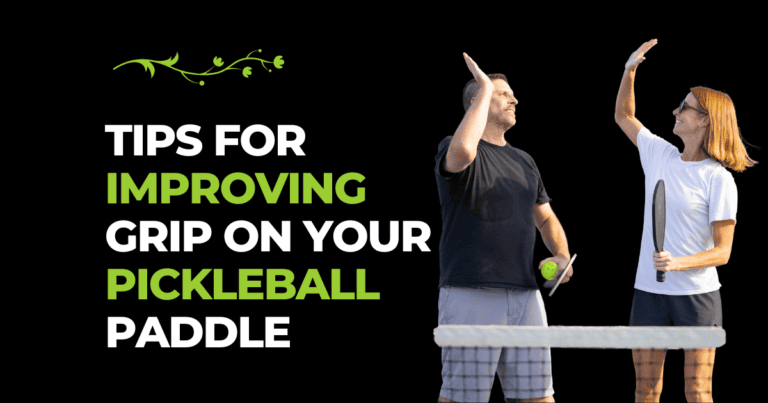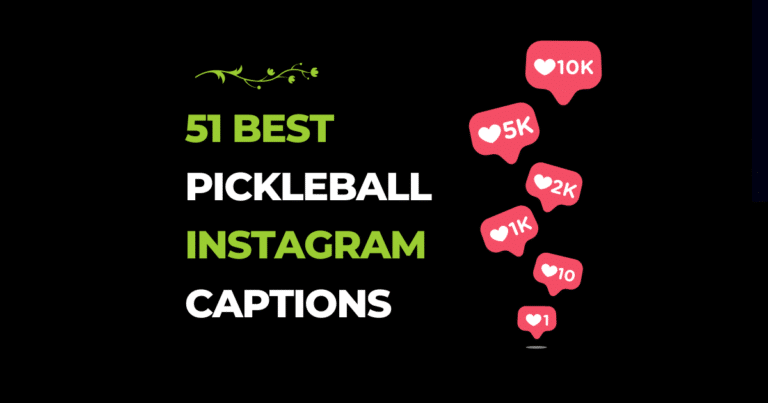Last updated on: December 9, 2023
Double hitting is a big NO-NO in competitive pickleball! But is it acceptable in casual rec games?
Read on to learn the full rules on this hot topic.
You’ll discover if those sneaky double hits are legal in tournament play or strictly forbidden. We’ll also look at gray areas like accidental double taps. Plus, find out what to do if a double hit call seems unfair during a heated game! Let’s get rolling!
What is Double Hitting in Pickleball?
Double hitting refers to hitting the ball twice in a row on one swing before it is returned to the opponent’s side. This can occur when the ball bounces off the paddle and the player hits it a second time to return it over the net.
Some examples of double hits in pickleball:
- The ball bounces on the face of the paddle and the player hits it again mid-air before it goes over the net
- The player makes contact with the ball twice on one swing instead of a clean single hit
- The ball is momentarily trapped against the paddle face and hit twice to pop it up
Double hitting allows players to recover bad shots and continue the volley. However, the rules on double hits vary for recreational and competitive pickleball.
Is Double Hitting Legal in Recreational Pickleball?
In casual pickleball games and many rec center leagues, double hitting is legal and commonly used. The exception is when a double hit carry occurs – continuously hitting the ball twice to move it down the court.
The main recreational pickleball rules on double hits:
- Double hitting on one shot is allowed
- Double carry hits to maneuver the ball are illegal
- Double hits are OK if the ball bounces off the paddle on the initial contact
Recreational pickleball emphasizes fun over technical rules. Double hitting gives beginners more chances to keep the ball in play as they develop skills. Allowing some double hits makes for longer, more enjoyable rallies for players at all levels.
Is Double Hitting Legal in Tournament and League Pickleball? ❌
In sanctioned pickleball tournaments organized by the USA Pickleball Association (USAPA) and other competitive leagues, double hits are illegal.
The main pickleball double hit rules for competitive play:
- Any double hit on one shot is a fault
- Only clean, single hits are legal returns
- Letting the ball bounce on the paddle then hitting it is illegal
- Double hits result in the opponent scoring a point
Making double hits against the rules increases shot precision and technical skills. Outlawing double hits also prevents players from unfairly manipulating the ball. Competitive pickleball emphasizes mastering control and accuracy.
Common Examples of Illegal Double Hits in Competitive Pickleball
Here are some examples of illegal double hit faults often called in tournament and league pickleball:
- The Paddle Drag – Letting the ball bounce on the face of the paddle then hitting it again mid-air. This paddle drag allows players to save errant shots.
- The Double Pop – Trapping the ball against the paddle briefly and popping it back up in the air to return. This gives players extra time to recover.
- The Continuous Double Hit – Repeatedly double hitting the ball to move it down the court in a double carry. This allows players to maneuver the ball in ways that competitive rules prohibit.
- The Mid-Air Tap – Making contact with the ball twice on one swing instead of a clean single hit. This gives players an extra chance to direct its path.
Judges watch closely for illegal double hits in competitive environments. Faults are called when players clearly make multiple hits before sending the ball to the opponent’s court.

Pickleball League and Tournament Rules on Double Hits
The top pickleball leagues and tournament directors all treat double hits as illegal under standard rules:
- USA Pickleball Association (USAPA) – The USAPA rulebook states double hits are not permitted in sanctioned tournaments. This applies to singles, doubles, and mixed doubles games.
- Professional Pickleball Association (PPA) Tour – The PPA bans double hits in all pro and amateur tournaments on the PPA Tour circuits across North America.
- Association of Pickleball Professionals (APP) – Double hits are outlawed in APP-sanctioned pro tournaments like the APP Championships and APP Nationals.
- Major League Pickleball (MLP) – The official MLP rulebook declares double hits a fault in league play and team championships.
- National Senior Games – The biennial multi-sport event for seniors prohibits double hits in pickleball matches under international rules.
Other amateur circuits, colleges, local recreation centers, and clubs follow the lead of major pickleball organizations by disallowing double hits in competitive play.
What Happens When a Double Hit is Called in Tournament Play?
During a sanctioned pickleball tournament, making an illegal double hit results in a fault call by the judge or referee:
- The double hit call ends the rally, awarding the point to the opposing player or team
- In doubles, the team that made the double hit faults and loses the serve
- In singles, the player at fault loses a point and service swap occurs
- The fault is officially recorded and impacts competitive scoring
Tournament players should avoid double hits, as they lead to lost points and service exchanges. However, not all double hit calls are clear-cut and can be disputed.
What to Do if a Double Hit is Disputed in Tournament Play
With the fast pace of pickleball, not all double hits are obvious. Players can dispute unclear fault calls regarding potential double hits:
- Ask for a replay due to interference – If a double hit call seems unfounded, ask for a replay due to interference. The call disrupted play, so a redo is reasonable. However, replays are typically only allowed once per match.
- Call for an official review – For APPA and USAPA sanctioned tournaments, players can request an official review if the double hit call is highly disputed. The referee will give a final ruling after examining available video or convening with line judges. Reviews are limited to just a few per match.
- Accept the call gracefully – If a double hit feels questionable but not egregious, it’s often best to accept the ruling and move on. Arguing close calls excessively can be poor sportsmanship in competitive environments.
By requesting occasional reviews or replays, unfounded double hit faults can be overruled. But players should also demonstrate good etiquette when borderline calls don’t go their way.
Can Double Hits Be Appealed in League Play?
Pickleball leagues generally have less formal appeal processes compared to tournaments. To appeal a double hit call in league play:
- Ask the opponent if they are certain it was a double hit – If your opponent is unsure on a borderline call, they may agree to replay the point in good faith.
- Ask an observing player – If other players witnessed the exchange, ask their opinion on whether a clear double hit occurred. Opponents may agree to abide by an observer’s perspective if there is uncertainty.
- Note the issue to the league coordinator – While rulings can’t be reversed post-game, bringing questionable double hit calls to the league’s attention can lead to enhanced referee training and tighter standards.
- Avoid heated arguments – Even if you feel strongly the double hit was called in error, courteously express your perspective and move on. Yelling or confronting opponents damages league culture.
Appealing double hits respectfully can lead to constructive dialogue and fairer play. But leagues lack formal review systems compared to pickleball tournaments.
Pickleball Double Hit Controversies and Debates
Despite clear rules prohibiting double hits in competitive play, some controversies and debates have emerged:
- Inconsistent or faulty double hit calls – With the fast pace of pickleball, some referees make incorrect or inconsistent calls on double hits. This can anger players who feel cheated out of points.
- Visibility of double hits – Some argue that tiny double hits are often impossible to see at full game speed. Slow motion replay is sometimes required to definitively detect them. This makes accurate in-game calling difficult.
- Double hits from paddle vibration – There is debate around whether very short double hits from paddle vibration or deformation after ball impact should count as faults. The double contact is near-instant in these cases.
- Altered paddle surfaces – New paddle textures and materials that increase ball spin and speed have been accused of enabling concealed double hits as the ball interacts longer with the surface. This can create a “gray area” around what constitutes a double hit.
Ongoing disagreements around double hit detection, impact, and fair calls will likely continue. Clear communication between players, spectators, and referees can help mitigate controversies.
Frequently Asked Questions About Double Hits in Pickleball
Is double hitting allowed in pickleball for beginners?
Double hitting is often permitted in beginner recreational pickleball to allow new players time to get comfortable with rallying the ball. But double hits are barred in competitive league and tournament play, even among beginner skill divisions.
What if a double hit is accidental in tournament play?
Accidental or unintentional double hits are still ruled as faults in competitive pickleball. Only clean, single hits return the ball legally. Players are responsible for control and can’t make excuses for accidental faults.
Can you double hit a pickleball serve?
No, double hitting on the serve is illegal. Only a single, continuous motion hitting the ball is allowed on the serve. Double bouncing the ball off the paddle face on the serve is also disallowed.
Are double hits permitted in wheelchair pickleball?
Standard wheelchair pickleball tournaments and competitive leagues forbid double hits, just as they are barred in standing pickleball. Recreational wheelchair pickleball often allows them among beginner players, however.
Does indoor vs. outdoor pickleball change the double hit rules?
No, the regulations prohibiting double hits are the same whether pickleball is played indoors or outdoors. Venue surface and conditions don’t impact fault rules.
The Bottom Line – Are Double Hits Legal in Pickleball?
In summary, here are the key rules and perspectives on double hits in pickleball:
- Recreational Pickleball – Double hits are usually legal and part of enjoying casual games and learning.
- Competitive Pickleball – Double hits are illegal in pro tournaments, sanctioned events, leagues, and ladder play. They result in a fault call and point for the opponent when made.
- Appealing Double Hits – Players can request reviews, replays or observer input on disputed calls, but should also demonstrate good sportsmanship.
- Ongoing Debates – Some close double hit calls remain controversial. Better referee training, video review and paddle regulation may improve consistency.
While recreational players can double hit freely, competitive pickleball requires learning to make clean single hits. Understanding the right context for legal double hits makes the game more enjoyable for all!

